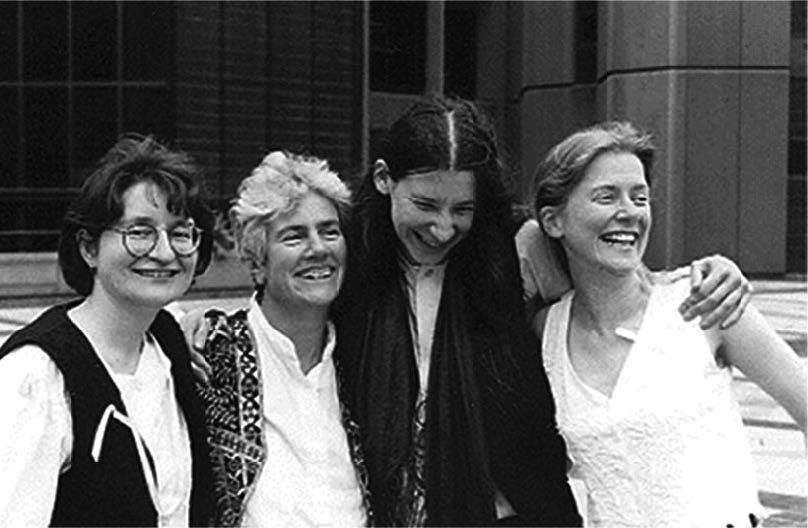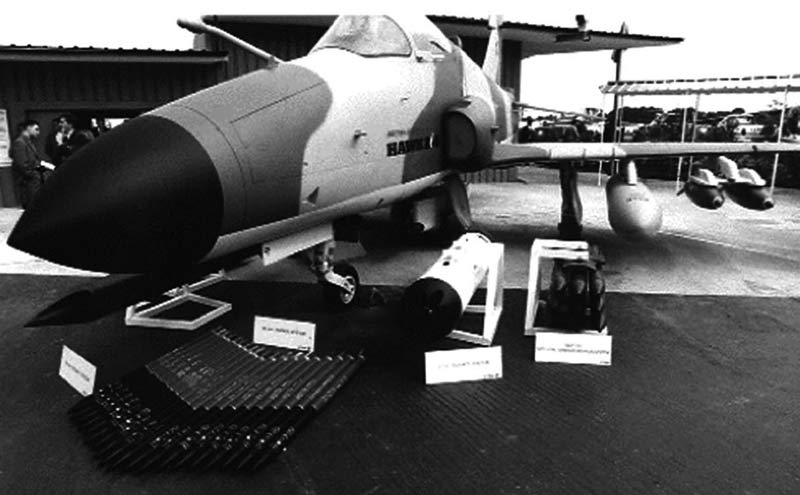
Disarming Women
In January three women disarmed a Hawk fighter with household hammers. Six months later, a Liverpool jury stunned the legal profession by acquitting them of causing £1.5 million of criminal damage. Neil Goodwin reports on their victory and the history of the Ploughshares movement.
Squall 14, Autumn 1996, pp. 20-21.
In the aftermath, puzzled judges called for an urgent investigation into the way juries think, while hard-nosed hacks no doubt filed the case away under: ‘PERVERSE VERDICT - NOT TO BE OPENED UNTIL THE NEXT BASKET-CASE JURY UPSETS THE JUDICIAL APPLECART’. But to those family and supporters who had packed the courtroom daily it was the culmination of one of the bravest acts of conscience in recent years.
For a jury to uphold the womens’ defence that they had used “reasonable force to prevent a crime” was as much a tribute to the groups’ skill and determination in taking the legal system on, as it was a ringing indictment of British arms manufacturers who bolster genocidal regimes.
The Hawk was part of £500 million contract to supply 24 planes to Indonesia, whose brutal occupation of neighbouring East Timor has resulted in 200,000 deaths since 1975. Despite government assurances that the Hawk is just a trainer, there have been numerous eyewitness accounts of Hawks from a previous deal being used to bomb defenceless villagers.
“I’d heard about a Hawk attack on a small village in East Timor when 30 women and children were killed,” explains Jo Wilson. “There were no survivors. I wrote letters and attended vigils and demonstrations, and yet nothing was changing.”
“By early last year it became increasingly obvious that the sale would proceed,” says Andrea Needham. “We knew that once the planes left Britain there’d be little more we could do, so the obvious thing seemed to be to stop them leaving by disarming them.”
The court heard how Andrea, Jo and Lotta Kronlid had converged on British Aerospace’s factory at Warton, Lancashire. Concealed amongst a group of plane-spotters, they identified the Indonesia-bound Hawks from serial numbers listed in military magazines.
“Before we went into the base we stood in a ditch and had a minute’s silence for the people of East Timor,” Andrea recalls. “We thought about why we were doing the action and tried to keep that feeling with us throughout.”
They waited for a security patrol to pass-by, crept over to the hangar from which they had seen Hawk ZH 955 emerge days before, and prised open the doors with a crowbar.
“For a long time I thought about the moment when we’d actually get there and see the plane in front of us,” says Andrea. “It had seemed almost impossible. But when we opened up the door and there it was right in front of us it was a pretty amazing feeling.”
Wielding a selection of ordinary household hammers, some decorated with slogans such as “All life is sacred”, the women set about hammering the nose cone and cockpit. Sophisticated radar and targeting systems were rendered inoperable in a matter of seconds.

“There was no hesitation because we just assumed we would be caught almost immediately,” Andrea continues. “It was inconceivable that we could get through all this British Aerospace security and nobody would notice that we were there, so we felt that we had to go for it immediately.”
As with the previous 57 Ploughshares “conversions” that have taken place since September 1980, when eight people disarmed two nuclear warheads in Pennsylvania, the women were prepared to take full personal responsibility for their actions, and welcomed the opportunity to explain their reasons in public.
The Ploughshares Movement takes its inspiration from the prophet Isaiah: “They shall beat their swords into ploughshares and their spears into pruning hooks”. In the last 16 years, activists throughout the world have caused over £4 million worth of damage to such weapons as Trident submarines, B 52 bombers and F-111’s, and served a collective total of 156 years in prison. For their action, the East Timor Ploughshares (Seeds of Hope) group had anticipated anything up to ten years imprisonment.
The Warton action was Britain’s third disarmament. In March 1990, Stephen Hancock and Mike Hutchinson, wearing Mickey Mouse ears and tabards emblazoned with the words: “Mickey Mouse Fan Club - Peace Section”, broke into USAF Upper Heyford and caused £200,000 damage to an F-111.
Three years later, Chris Cole was arrested at BAe’s Stevenage site for causing £90,000 damage to a Hawk, a Tornado and the (then called) European Fighter Aircraft (see Squall 10).
In the first of two trials, Chris contested his right to use “reasonable force in the prevention of a crime”, as enshrined in the Criminal Law Act 1967. The judge, Stephen Sedgley, instructed the jury to use their “conscience, common sense and common humanity” in reaching a verdict and added: “If what Mr Cole says is happening in East Timor, it may amount to genocide which is a crime under British and International Law”. There was a hung jury. For a while a moral chink appeared in BAe’s armour, but Chris Cole eventually received eight months imprisonment for criminal damage.
The biggest concern for Ploughshares activists has always been whether or not the judge will recognise their defence. In one famous case in 1988, Katya Komisaruk was denied the opportunity to even mention the nature of her target, let alone cite international laws or explain her motives.
The previous year Katya had entered California’s Vandenberg Airforce Base through an open and unguarded gate. Having left flowers, a packet of biscuits and a note for a guard which read: “I have no gun, you must have lots. Let’s not be hasty, no cheap shots. Have a cookie and a nice day”, she broke into the NAVSTAR complex, home to America’s nuclear ‘Global Positioning System’.
Using a hammer, crowbar and boltcutters, Katya’s two hours of undetected disarmament resulted in $0.5 million worth of damage. She smashed the mainframe computer, squirted it with a fire extinguisher and danced on the circuit boards, before climbing onto the roof to hammer the satellite dish responsible for initiating America’s “First Strike” capability. Eventually she hitchhiked home and calmly announced her actions at a press conference the folowing day.
During her trial in Los Angeles, the jury was prevented from seeing photographic evidence of sprayed messages concerning the Geneva Convention and the Nuremberg Principles. Deprived of a context, her act of disarmament was reduced to the level of mindless vandalism and she was sentenced to five years
Andrea, Lotta and Joanna were eventually taken to Lytham St Annes police station. A fourth woman, Angie Zelta who was working on the outside was later arrested on a conspiracy charge having publicly stated her intention to continue the work. Each served six months on remand at Risley prison.
“The other prisoners were tremendously supportive,” Andrea recalls. “They’d say, Well of course it was right. It was going to kill people and you stopped it’, explaining why we waited around afterwards was more difficult. But I think people could understand that. They’d say:‘You knew it wasn’t a crime so you didn’t run away’”.
Throughout the trial, friends and supporters gathered outside the bombed-out ruins of Liverpool’s St Lukes church to remember East Timor’s dead. Around their necks cardboard pendants carried the stark details of individual tragedies: ‘Domingos, 10 years - Killed...Bernardino Mendes (Age 22) - Wounded..Lourenco - Missing, feared dead.’
"When he said 'not guilty' there was this huge gasp around the courtroom. We didn't dare breathe until he'd read out each of the seven verdicts. And then the whole courtroom erupted."
Liverpool’s Christian community flocked to the court daily. Dozens of white crosses were fixed to the barriers outside the main entrance where Buddhist nuns and Catholic priests knelt before makeshift shrines praying for justice. Merseyside church leaders even wrote a letter to John Major calling for a halt to the Hawk deal.
“This parish has always reflected on justice issues,” said Father Fitzgerald who hung a banner outside his church saying:‘Ground the Hawks. Set free the doves of peace.’ ‘The womens’ unashamed action for life has been embraced by the people of Liverpool. This trial has been a festival of light and truth.” Inside the packed courtroom, Vera Baird, barrister for Joanna Wilson, opened the case for the defence. The women, she said, had “lawful” excuse to disarm Hawk ZH 955 because they were using “reasonable force to prevent a crime”. “Slashing a tyre is criminal damage,” she explained to the jury. “But if it was on a car carrying a bomb to Manchester, then slashing it could be seen as a lawful excuse.”
Remarkably, Judge “Wicked” Wickham allowed the screening of video evidence containing shocking footage of 1991’s Santa Cruz massacre when Indonesian troops opened fire on a peaceful protest, killing 271.
Defence witnesses included John Pilger, who had entered East Timor in 1993 posing as a travel consultant to film the documentary Death of a Nation. “I have reported from war zones like Cambodia and Vietnam, but I have never seen anything like East Timor,” he told the court. “The country was like a vast cemetery, covered in crosses with the names of entire families marked on them.”
Also giving evidence was Jose Ramos Horta, East Timor’s exiled Foreign Minister, whose family had been murdered by the Indonesian military. Andrea, who like Angie and Lotta, defended herself, asked Horta what would happen to someone who tried to disarm a Hawk in East Timor. “They would be shot,” he said. “Someone was recently given four years hard labour just for sending a fax to Amnesty International.”
Prof Paul Rogers from Bradford University’s School of Peace Studies, told the court that Hawk ZH 955 had been due to join Indonesia’s Bandung squadron for tackling insurgents.”
He rejected BAe’s claim that the Hawk is “merely a trainer”. “The Hawk has a significant ground-attack capability,” he said. “It can carry up to eight cluster-bombs, which rain down shrapnel like razor blades.” Hundreds of Liverpudlians descended on the court for the verdict. Housewives, nuns and peace-camp veterans crowded round the entrance to court four. Chain smoking pensioners paced the corridor like expectant grandparents. “I tend to be a bit pessimistic,” Andrea admits. “When the foreman stood up I was thinking: Well, I’ve prepared myself for several years in jail and here it comes. And that’s okay because what we did was right. When he said “not guilty” there was this huge gasp around the courtroom. We didn’t dare breathe until he’d read out each of the seven verdicts. And then the whole courtroom erupted.”
In the corridor pensioners whooped for joy and banged on the windows. Nuns raced for the lifts leaving bewildered security guards in their wake. Outside, hundreds of locals danced in the courtyard singing: “Give peace a chance.”
“We were overwhelmed by the courage of the jury in accepting what had been said,” says Joe. “That verdict was an indictment of British Government policy and British Aerospace’s actions in selling weapons to Indonesia. It was a day for justice and a day for East Timor.” The women now intend to bring out a private prosecution against BAe for contravening the Genocide Act.
Related Articles
Seeds Of Change - Three women peace campaigners break into British Aerospace factory to disable military jets bound for Indonesia. Squall 12 - Spring 1996.
Hawks And Doves - Andrea Needham writes from her prison cell on why she smashed up a Hawk aircraft with a hammer. Squall 13 - Summer 1996.
Cook Admits British Riot Gear Used In Indonesia - Foreign Secretary Robin Cook admits Suharto goons used British arms equipment against rioters. Squall 16 - Summer 1998.
To Do The Right Thing - Andy Johnson interviews Chris Cole, currently in prison for hammering £100,000 worth of damage to BAe military equipment as part of the Swords Into Ploughshares peace movement. Squall 10 - Summer 1995.
